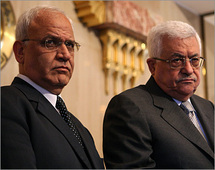With talks at impasse, Palestinians explore other options
Nasser Abu Bakr
RAMALLAH, Nasser Abu Bakr- After nearly two decades of sputtering peace talks that have failed to bring about their promised state, the Palestinians are exploring other options.
President Mahmud Abbas, fed up with Israel's refusal to halt settlement construction on occupied Palestinian land, this weekend said there would be no further negotiations until the construction stops.

Abbas and Origat
"The negotiations with Israel have been ongoing for more than 19 years since the Madrid peace conference in 1991 and until now have not achieved anything," said Mohammed Ashtayeh, a member of the Palestinian negotiating team.
"It makes no sense for the Palestinian people to continue to wait for an Israeli government that wants peace and a US administration that is able to pressure Israel. Experience has made it clear that is not going to happen.
"It also does not make sense to leave it to the occupation to end the occupation," he added.
Since direct negotiations began in the early 1990s, the Palestinians have often viewed the peace process as a mechanism for the United States to pressure Israel to withdraw from territories occupied in 1967.
But in more than a year and a half of shuttle diplomacy Washington has failed to get Israel to completely freeze settlement activity, which the Palestinians view as a crucial test of the entire process.
"It's clear that there will not be serious US intervention in the interest of the Palestinians, and even if there were, the Israelis would not respond," said Samir Awad, a professor at Birzeit University in the West Bank.
Israeli Prime Minister Benjamin Netanyahu has refused to renew a partial moratorium on new settler homes that expired late last month, insisting his rightwing-led coalition would never support such a move.
At a meeting in Libya over the weekend Arab foreign ministers backed Abbas's position that there should be no further negotiations without a settlement freeze but gave Washington another month to try to broker a compromise.
Meanwhile Abbas, who has been pursuing a negotiated solution to the conflict for over three decades, presented a list of alternative paths to statehood.
One option would be to ask the UN Security Council to declare a state on Palestinian lands occupied by Israel in 1967, but Abbas has also hinted that he might resign from the Palestinian Authority or dissolve it altogether.
"(Abbas) has started to doubt that the path of negotiations will lead to a solution with Israel," Palestinian analyst Hani al-Masri said.
"I think he is almost convinced that the negotiations have failed."
The Palestinians would be highly unlikely to surmount a US veto should they demand drastic action from the UN Security Council, but a decision by Abbas to resign or dissolve the Palestinian Authority could deal a major blow to both the United States and Israel, who strongly support him.
"The only serious alternatives are the unilateral ones," said Yossi Beilin, a former Labour party minister who was involved in peace negotiations with the Palestinians throughout the 1990s.
"A Palestinian threat to dissolve the Palestinian Authority is something they can do. They don't need anyone to confirm this. This has been a threat for years now, and it's a threat today," he said.
The dismantling of the Authority would potentially force Israel to take over the cost of governing the nearly 2.5 million residents of the West Bank and spell the end of the peace process launched with the 1993 Oslo accords.
Abbas could take the less drastic step of resigning as president with no clear successor, but Beilin believes that would be welcomed by those in Netanyahu's mostly rightwing government who oppose a negotiated solution.
"I'm not sure that the resignation of Abu Mazen is a threat to Netanyahu," he said. "A moderate Palestinian leader who is ready to compromise is much more a threat to the extreme Israelis than an extreme Palestinian."
--------------------------------------------------------------------------